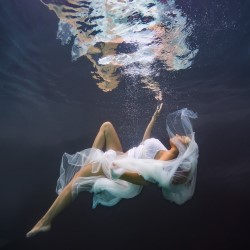Edinburgh Festival Fringe 2018 Review: The Drowned Bride***
When Daphne du Maurier’s Rebecca was first published in 1938, no less a critic than VS Pritchett said it would be ‘here today, gone tomorrow.’ Which shows just how wrong you can be, as the novel has never gone out of print and is still selling thousands of copies a year. It’s been adapted for film (notably by Alfred Hitchcock in 1940), stage, radio and television, and even turned into an opera, and now Shrewsbury School Drama Department has brought a new musical version, The Drowned Bride, to the stage of Paradise in Augustines on George IV Bridge. The book is about the marriage of handsome widower Max de Winter to a woman whose name we are never told, (‘the second Mrs de Winter’) a marriage haunted by the memory of the first Mrs de Winter, the eponymous Rebecca, who was apparently perfect in every way. Except, of course, she wasn’t.
 After a menacing prelude, in which Max’s housekeeper, Mrs Danvers, tells us in song of Rebecca’s last night on this earth, The Drowned Bride opens in Monte Carlo, where the wealthy Mrs Van Hopper is passing her time with her paid companion. Jesse Inglis Jones inhabits the role of the American socialite with great confidence, as a woman with lots of money, little grace and even less self-awareness (‘No-one knows the things a woman suffers when she’s born to be worshipped and adored’) In the first of many well-choreographed numbers the ensemble cast sing and dance about their self-indulgent lifestyle, and in her solo Inglis Jones shows us that her singing is every bit as good as her acting.
After a menacing prelude, in which Max’s housekeeper, Mrs Danvers, tells us in song of Rebecca’s last night on this earth, The Drowned Bride opens in Monte Carlo, where the wealthy Mrs Van Hopper is passing her time with her paid companion. Jesse Inglis Jones inhabits the role of the American socialite with great confidence, as a woman with lots of money, little grace and even less self-awareness (‘No-one knows the things a woman suffers when she’s born to be worshipped and adored’) In the first of many well-choreographed numbers the ensemble cast sing and dance about their self-indulgent lifestyle, and in her solo Inglis Jones shows us that her singing is every bit as good as her acting.
Within days Max and the girl – for girl she certainly is, in appearance and behaviour – who is soon to be his new bride are betrothed, Mrs Van Hopper sails off to New York (though not without issuing a few warnings about the perils of taking over from the legendary Rebecca), and the ensemble enjoy a good gossip about this whirlwind romance.
But of course, all is most certainly not about to end well; already the ghost of Rebecca has appeared, in the form of a woman dressed in red who weaves a dance around the lovers. This device is, I feel, of limited success, as the dance is so balletic and full-on that it sometimes distracts us from the main action. Rebecca’s ‘presence’ is, of course, central to the plot, her dominating personality one of several things that make the new Mrs de Winter’s life increasingly unbearable, but for me the dancing was a little too ethereal. Rebecca is supposed to have been a seductress, a vamp, a charming, manipulative psychopath who commanded attention on every occasion; in The Drowned Bride she seems wraith-like and almost innocent.
Once Max and his new wife return to his ancestral home at Manderley, there can be only one (living) star of the show. Sophia Price is magnificent as the obsessive, resentful, terrifying Mrs Danvers. Her haggard white face and straight dark hair perfectly reflect the decay within, while her excellent singing points to her bitter, deluded nature.
Other performances of note in this production include Abi Watkinson as Beatrice, whose early disdain for her brother’s new wife soon turns to sympathy and support, and Ben Lloyd as Ben Carminowe, who does a fine job of expressing this character’s fear and confusion. Oliver Shutts also manages to create an interesting cameo as Colonel Julyan, and Freddy Williams is good as the slimeball Jack Favell.
The Drowned Bride is an interesting new take on a classic book. It may not explore the deeper issues raised in Du Maurier’s original text, but it takes us through the story at a cracking pace, with plenty of song, dance and excitement along the way; the appreciative, packed audience on Monday clearly loved every minute.
The Drowned Bride is at Paradise in Augustines, 41 George IV Bridge (Venue 152) at 1.15pm every day until 25 August. Tickets are available from the Fringe Box Offices, online here or on the door, subject to availability.